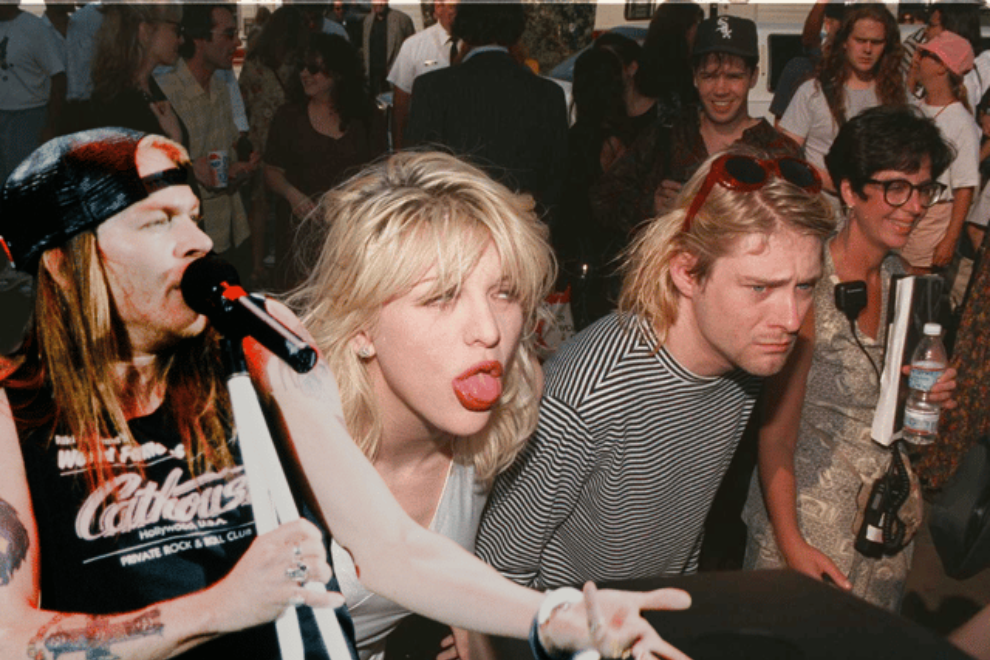
As Kurt Cobain would have celebrated his 58th birthday in February 2025, it’s a fitting moment to look back at one of the most infamous feuds in rock history—the clash between Nirvana and Guns N’ Roses. This conflict, which played out in public spats and backstage confrontations, symbolized the stark contrasts in the philosophies of two of rock’s most influential groups, each representing a different side of the musical spectrum in the early 1990s.
Diverging Philosophies
At the heart of the feud lay a fundamental difference in the approach to fame and music.
Nirvana, fronted by the iconic Kurt Cobain, emerged as the face of the grunge movement, bringing authenticity and a DIY ethos to the forefront. The band’s sound and image rejected the excesses of the 1980s glam metal scene, with Cobain himself often speaking out against the commercialization of music. He was particularly vocal about his disdain for what he perceived as “sell-out” behavior from mainstream artists. In a 1992 interview with *Rolling Stone*, Cobain famously remarked, “There’s always going to be an Axl Rose in the music world… but I don’t want to be that.”
On the other hand, Guns N’ Roses, led by the enigmatic Axl Rose, embodied the larger-than-life persona of the glam metal era, characterized by big hair, high-energy performances, and a penchant for excess. While the band enjoyed massive commercial success, Rose expressed a more complicated relationship with fame. In a 1992 *Rolling Stone* interview, he admitted, “Fame is a funny thing. It can be really great and give you a lot of things that you want, but it can also make you really miserable and take away a lot of things that are real.” Despite this, Guns N’ Roses continued to thrive in the mainstream, and their brand of rock’n’roll couldn’t have been more different from the raw, introspective energy of Nirvana.
The MTV Video Music Awards Incident
The tipping point of the feud came during the 1992 MTV Video Music Awards. Backstage, an incident involving Courtney Love, Cobain’s wife, and Axl Rose escalated tensions between the two bands. Love, in a playful moment, joked about asking Rose to be the godfather of their child, which reportedly angered Rose. The exchange quickly turned hostile, with Rose unleashing a string of insults toward both Cobain and Love. Cobain later recounted the moment, recalling that Rose “stopped dead in his tracks and started screaming at us, all these abusive words.”
The incident was a public demonstration of the growing animosity between the two frontmen, but it wasn’t the only time their paths crossed in volatile ways. The very public nature of the exchange made it clear that the differences between the two camps were irreconcilable.
Aftermath and Reflections
In the wake of this altercation, the bad blood between Cobain and Rose only deepened. Cobain refused an offer from Guns N’ Roses to tour together, citing the vast philosophical differences between the two groups. 
The fallout from the feud didn’t go unnoticed. Nirvana’s influence only continued to grow, with their raw and unapologetic sound becoming a defining feature of the alternative rock movement. Meanwhile, Guns N’ Roses continued to carve out their place as rock icons, known for their bombastic performances and unapologetic attitude. Despite their differences, both bands left an indelible mark on the music scene, with Nirvana’s grunge revolution and Guns N’ Roses’ legacy of classic rock anthems each shaping the landscape in distinct ways.
The Bigger Picture
The feud between Nirvana and Guns N’ Roses encapsulated a larger cultural shift within the music industry. The early ’90s marked the rise of grunge and alternative rock, a genre that rejected the excesses of the 1980s and brought an emphasis on authenticity, emotional vulnerability, and anti-commercialism. At the same time, the glam metal scene, embodied by Guns N’ Roses, represented the tail end of an era of hedonism, big hair, and stadium-sized rock anthems.
Their feud was more than just a clash of personalities—it was symbolic of the changing times in rock music. Nirvana’s grunge ethos represented the new guard, ready to break down the old, while Guns N’ Roses’ iconic status symbolized the final moments of the 1980s excesses that had dominated the previous decade.
Leave a Reply